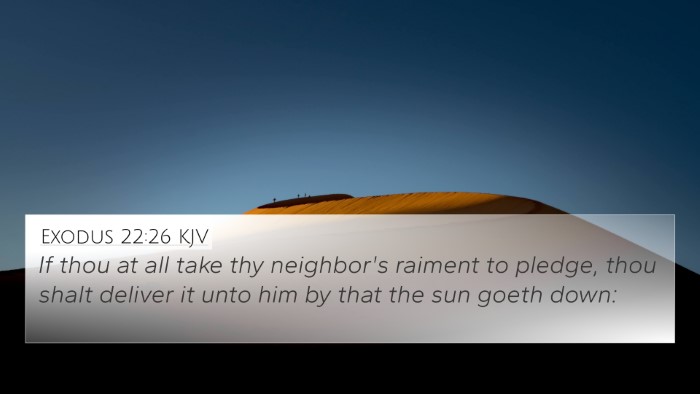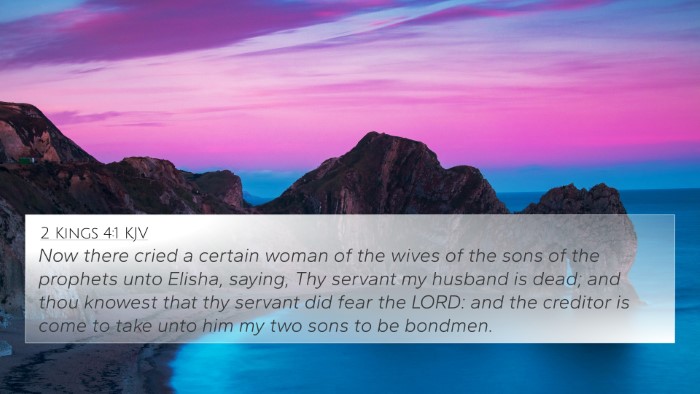Proverbs 22:27 - Summary and Meaning
Proverbs 22:27 states: "If you have nothing with which to pay, why should he take away your bed from under you?" This verse addresses the principle of financial responsibility and the consequences of borrowing without the means to repay.
Interpretation from Various Commentaries
Matthew Henry's Commentary
Matthew Henry emphasizes the importance of self-reflection when dealing with debts. He highlights that borrowing implies a duty to repay, and defaulting on a loan can lead to severe consequences, such as losing one’s possessions. Henry warns against taking on debts one cannot manage.
Albert Barnes' Notes
Albert Barnes provides insight into the social implications of debts. He notes that if a borrower is unable to repay their loans, they may find themselves in a precarious situation. Losing one’s bed symbolizes a loss of security and comfort due to financial irresponsibility. Barnes calls for careful consideration before entering any financial agreements.
Adam Clarke’s Commentary
Adam Clarke draws attention to the metaphorical significance of "taking away your bed." He interprets it as not merely a loss of material possessions but a loss of peace and stability in life. Clarke stresses that being in debt without the means to repay is a perilous position that can lead to larger problems. He encourages the reader to ponder the long-term implications of financial decisions.
Key Themes and Connections
This verse reflects critical themes in the Bible regarding financial stewardship, responsibility, and the moral obligations that come with borrowing. It connects to various biblical principles regarding debt and wisdom in financial matters.
Cross-Referencing Related Bible Verses
- Proverbs 17:18: "A man devoid of understanding shakes hands in a pledge, and becomes surety for his friend." - This verse warns against making rash financial commitments.
- Proverbs 22:26-27: The preceding verses also caution about becoming a guarantor and the repercussions of failing to repay any borrowed amount.
- Romans 13:8: "Owe no one anything except to love one another." - A reminder of the moral obligation of only incurring debts we can repay.
- Luke 14:28: "For which of you, intending to build a tower, does not sit down first and count the cost?" - Highlights the importance of foresight and calculation before committing to financial obligations.
- Proverbs 21:5: "The plans of the diligent lead surely to plenty, but those of everyone who is hasty, surely to poverty." - Advises against hasty financial decisions without careful planning.
- 1 Thessalonians 4:11: "Aspire to live quietly, and to mind your own affairs, and to work with your hands." - Suggests personal responsibility and diligence in managing one's affairs, including finances.
- 2 Corinthians 9:7: "Each one must give as he has decided in his heart, not reluctantly or under compulsion." - Explores the attitude in which one should approach obligations, including financial ones.
- Proverbs 22:5: "Thorns and snares are in the way of the perverse; he who guards his soul will keep far from them." - The dangers of making poor choices, including financial ones.
- Deuteronomy 15:6: "For the LORD your God will bless you, as He promised you." - Discusses the blessings that come from ethical financial behavior.
- Matthew 5:25: "Agree with your adversary quickly..." - Speaks to the importance of resolving debts promptly before they result in bigger issues.
Tools for Bible Cross-Referencing
Understanding and interpreting Proverbs 22:27 can be enhanced through the use of various tools:
- Bible Concordance: This is essential for finding specific terms related to borrowing and debt.
- Bible Cross-Reference Guide: Useful for identifying verses that share similar themes regarding financial obligations.
- Cross-Reference Bible Study: Engaging with the text in this way allows a deeper understanding of relationships between verses.
Conclusion
Proverbs 22:27 serves as a crucial reminder of the responsibilities that accompany borrowing. Its interpretation encourages mindfulness and foresight in financial matters. When combined with the insights from various commentaries and related scriptures, this verse provides a comprehensive approach to understanding debt and financial responsibility in life.
Encouragement for Further Study
To truly grasp the wisdom in Proverbs 22:27, readers are encouraged to explore the connections between Bible verses through tools and methodologies for cross-referencing. Engaging with the biblical text in a comparative manner will reveal deeper truths and alignments within scripture. Understanding these connections ultimately fosters a richer biblical understanding and promotes responsible living according to divine principles.





